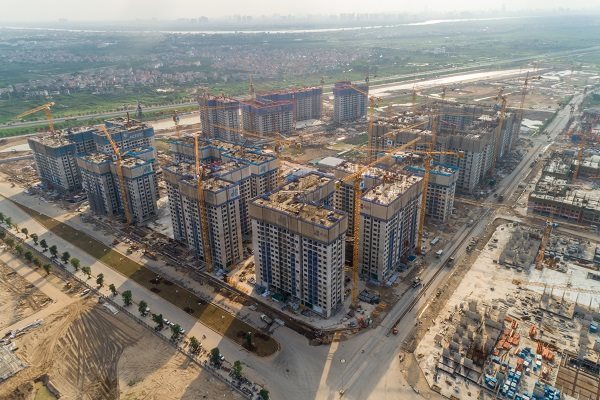Meanwhile, the government has been applying drastic measures to cut lending to the real estate sector. As a result, realtors find it difficult to access bank loans.

“Banks tend to restrict disbursement for real estate projects. The lending interest rates are very high,” Nam said.
The lending interest rates have increased to 11-12 percent per annum. Banks now can use only 40 percent of mobilized short-term capital for medium- and long-term lending instead of 45 percent.
Meanwhile, the risk factor for loans to the real estate sector has been raised from 150 percent to 200 percent.
| The lending interest rates have increased to 11-12 percent per annum. Banks now can use only 40 percent of mobilized short-term capital for medium- and long-term lending instead of 45 percent. |
All these new regulations have made commercial banks hesitant to disburse money.
The challenges for real estate firms also come from administrative procedures. The government has tightened control over the licensing of real estate projects.
The delay in approving projects and the decisions to suspend projects for examination has led to a supply decrease, bringing about a decrease in the number of transactions. The supply has become short, while the demand increases.
The short supply and high demand have pushed real estate prices up. People, especially medium- and low-income earners now have fewer opportunities to own houses.
Sharing the same view, Nguyen Van Dinh, secretary general of the Real Estate Broker Association, said the market has become unstable because of the shortage, while real estate firms have suffered because of the high costs.
Meanwhile, Chair of the HCM City Real Estate Association (HOREA) Le Hoang Chau warned that the current problems may cause some real estate firms to go bankrupt.
Experts and realtors all said that the biggest problem lies in the lack of clear legal framework. The market now has to wait for many laws and legal documents which are under amendment, such as the Law on Planning, Land Law, Housing Law, Construction Law and Real Estate Business Law.
There is still no legal framework for condotels. This, plus the collapse of Cocobay condotel project, have caused resort real estate developers to shrink back.
HOREA recently sent a document to the Prime Minister and relevant ministries, urging to set up a legal framework on condotel development soon. Chau warned that the legal framework puts secondary investors (resort real estate buyers) at high risks.
Kim Chi

Remittance soaring to benefit real estate projects?
With the market warming up at the end of last year, the number of real estate deals has also been on the rise thanks to soaring remittances.

Real estate retains second position in FDI attraction
Real estate remained the second biggest magnet for FDI in 2019, following processing – manufacturing, as it attracted $3.88 billion FDI, equivalent to 10.2 percent of the total registered.
 Nguyen Tran Nam, chair of the Vietnam Real Estate Association, said the real estate market shows an increasingly important role in the national economy. However, the majority of real estate firms still have small scale and heavily rely on bank loans.
Nguyen Tran Nam, chair of the Vietnam Real Estate Association, said the real estate market shows an increasingly important role in the national economy. However, the majority of real estate firms still have small scale and heavily rely on bank loans.